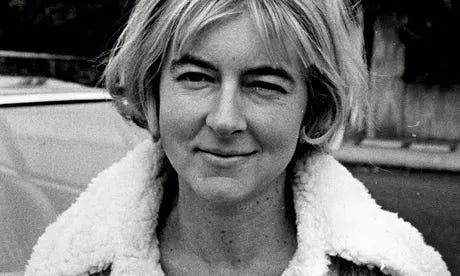The British writer and poet Rosemary Tonks is a shadowy figure of the London era 1960s. I believe I heard her name by passing in either a video or essay by the artist Momus some years back and presently due to the 2022 reissue of her second novel (of six altogether), The Bloater (New Directions). This 1968 novel seems to come from another era and has close ties to the avant-garde world of London literature, but it also reminds me a bit of P.G. Wodehouse due to the witty dialogue. Like all of my favorite novels, it doesn’t have a plot but a terrific series of moments between the characters as they interact in romantic/sexual/social manners.
The main character Min is a sound editor for BBC and works in their Radiophonic Workshop, which is of great interest. I’m slowly researching that world of music/sound-making on the BBC with pioneer electronic artists like Delia Derbyshire. One can presume that there may be some Delia in Min, or Delia could be her co-worker, Jenny. In a novel like The Bloater, one can wonder who is who from Tonks’s life, but that may be a game only played by the reader or the critics of the book. The drift of The Bloater is Nin playing out in her mind and with friends who are the better lover-material between two fellows, Billy and Claudi. One of great interest is the Bloater, Nin’s unkind nickname for her suitor Claudi. He’s a large fellow and an opera singer, and she’s equally grossed out and intrigued by his presence. As she chooses, Min is also married to a phantom figure of a husband, George, who is barely present in her life. George may have a separate private life with another woman or not. He’s like a cork in the ocean, coming and going as the wind blows.
The Bloater is a British novel that conveys the inner workings of characters that seem to be chess pieces or chunks of a jigsaw puzzle. It’s emotional but done in an understated manner. The book takes place in the late 1960s. Still, nothing is happening outside of Min’s world, except her visits to the pub with Jenny and her involvement with three men, but done in a Nöel Coward method of good manners with a light touch of outrageous behavior from Min and Jenny. And also indicates the classic Morrissey via the Smiths era, in the approach to the subject matter, of love being sour-flavored but in a dour method of looking at the world. Her description of Claudi, who she calls the Bloater, is visually disgusting. I had to look up the word Bloater, a herring that is smoked whole and stinks to high heaven.
The truth is Tonks did work with Derbyshire and others in the BBC Electronic workshop on a specific project, Sono-Montage, which was broadcast at 10.25 pm on 21st June 1966. Tonks writes a lively description of the BBC studio and how Jenny (Delia) does her magic there. The beauty of this book is that for decades it has been ignored. Still, now, we are offered an entrance (thank you, New Directions) to a rich world. If anything else, Rosemary Tonks, through her beautiful sentences and dialogue, is a superb writer.
Due to her ill health and her mother's death, Tonks went through a spiritual journey in which she ended up being involved with a strict reading of Christianity. Like her hero Arthur Rimbaud, she removed herself from the literary world, family, and friends and became a recluse. Tonks also tried to destroy her published works at various libraries, so Tonks was someone who wanted to erase her past. As of this writing, the only books easily purchased are The Bloater and a compilation of her poetry Bedouin of the London Evening (Bloodaxe Books). She died in 2014, but I feel like I’m starting a new life by reading her. This is the first time I have finished a book and then started immediately to reread The Bloater. I’ll get to her poetry shortly.
Interview with Rosemary Tonks: Here
Here’s a link to a discussion about Tonks and The Bloater - very enjoyable. Blacklisted on Rosemary Tonks





Excellent....a new discovery for me as well. Thanks for sharing.
THANK YOU! Reading this later, VERY interested!